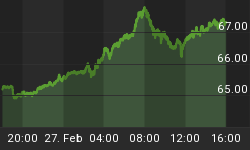Once again, rumors are sweeping the European markets that the European Central Bank (ECB) is preparing itself for an interest rate cut come September/October. This time around, the sparks were yesterday's Reuters news story citing "ECB sources" as saying that the bank's Governing Council members were split over whether another rate cut would help boost Euro-zone confidence; followed by today's 50bp rate cut from the Swedish Riksbank.
Meanwhile, the day's data have been, as usual, a mixed bag. On the downside came the news that French consumer spending dropped about twice as much as expected in May, with household spending on manufactured goods down 0.9% on the month. Purchases of durable household goods were down a hefty 4.0% on the month.
On the upside, German investor confidence actually rose in June for the first time in three months. The ZEW financial market indicator rose to 19.5 from 13.9 in May, apparently boosted by the recent fall in the euro and by the prospect of a change in government in Germany in September. Given how much ECB President Trichet keeps going on about the need to boost consumer and business confidence in the Euro-zone, this suggests things are looking up - i.e., lowers the chances of a September/October rate cut.

But before we get too carried away, note that the ZEW index is still running well below its long-term mean of around 34. And, in any case, the ZEW survey isn't a very good leading indicator of Euro-zone developments. While it does ask about the overall outlook for the German economy, and as such has been getting a lot of press attention of late, it's a fairly narrow survey of just 400 analysts at German financial institutions and companies. There are two other indicators coming out soon that will give a much better idea of whether the Euro-zone is in one of those infamous "soft patches" or is headed for another fall.
First up is one of our favorite leading indicators for the Euro-zone, the Belgian National Bank's business climate index. This has predicted future trends in Euro-zone GDP for the past decade (although it's a mere 4% of Euro-zone GDP, Belgium sends some 80% of its exports to its Euro-zone partners). The indicator for June comes out tomorrow (Wednesday 22nd). The index has been headed more-or-less downward for the past year, coming in at -12.4 in May. If it drops again in June, look for more rate-cut chatter.

The other Euro-zone indicator to watch is the German Ifo survey, which comes out next Monday (27th). The Ifo is a much broader confidence survey, based on responses from over 6,000 German companies. It asks about both current business conditions and about business expectations, and has been a good leading indicator of Euro-zone industrial production in recent years. The Ifo has been pointing inexorably downward so far this year, sliding from 96.4 in January to 92.9 in May. If it slides again in June, rate cut fever will increase.

Yet all this rate cut speculation is not really warranted. Yes, the Swedish Riksbank did lop an unexpectedly-aggressive 50 basis points from its main policy rate today, and yes, like the ECB the Riksbank has been under political pressure to ease, and yes, Sweden has seen slower than expected growth and inflation. However, the Swedish economy clearly hit the skids in Q1, with real GDP growth coming in at 1.4% on the year, rather than the 2.5% expected by its central bank. That caused the bank to cut its GDP forecast for the year from 3.2% to just 1.9%. And, the Riksbank's forecasts see inflation running well below its 2.0% target both one and two years ahead.
The ECB, on the other hand, is still worried about future inflation risks - Euro-zone CPI did come in at 1.9% in May, but that's barely below the 2.0% target. With oil prices on the up again and the euro sliding against the dollar, there is every reason to fear that inflation will be firmly back over the 2.0% level in Q3. And Euro-zone growth as a whole has been sluggish, rather than clearly dropping. M3 money supply growth certainly doesn't point to any liquidity constraints on economic activity.

So, despite today's numbers and chatter, we're still at the same point as we were two weeks ago (see June 6, "The politicians will whine but the ECB is not about to ease.") Watch the various Euro-zone data releases over the coming couple of months, especially things like the Belgian leading indicator and the German Ifo. And watch for any impact of higher oil prices and a weaker euro on inflation expectations across the 'zone. Only if the former are clearly weakening and the latter not worsening, will the ECB feel comfortable with a rate cut.















